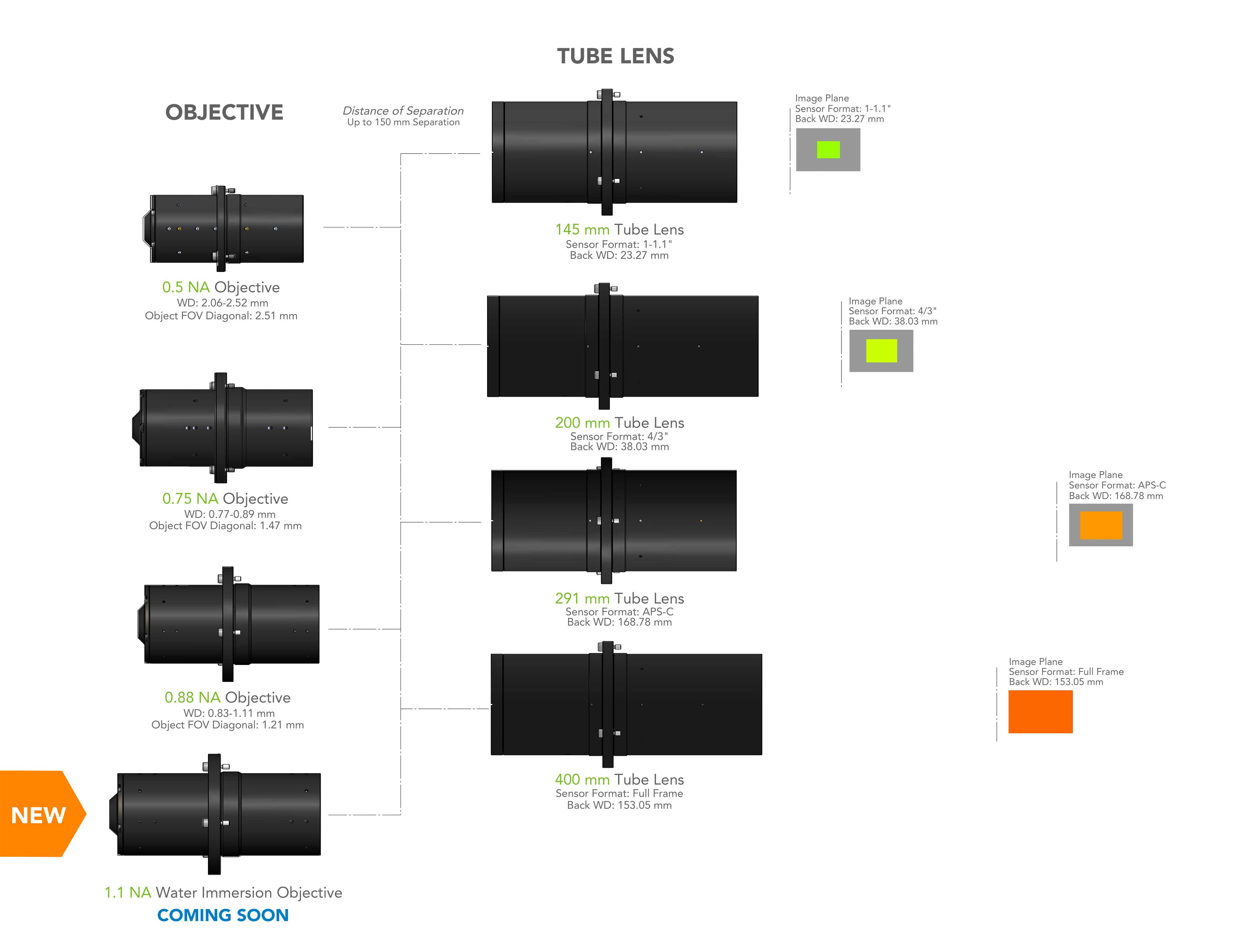
Melles Griot® XPLAN™ CCG Lens Series
Fluorescence Microscope Imaging Lenses
Review Specifications Explore Objectives & Download Drawings
Explore Tube Lens & Download Drawings Request Info and CAD Files
Problem: Struggling to keep up with the fast-paced world of Life Science discoveries and clinical development, where the need for cutting-edge instruments is constant?
Advancements in new Life Science technologies are rapidly changing the way we understand health and disease. These technologies allow scientists and researchers to study cause and effect of diseases and evolutions, come up with new diagnostics, drug targets and therapeutics by interrogating millions of targets at the cellular, sub-cellular, and molecular (DNA/RNA) levels at an unprecedented pace. Fluorescence microscopy plays a critical role in enabling the sub-micron imaging capabilities from Next Generation Sequencing, Next Generation Proteomics, and Spatial Biology instruments.
Moreover, since mission-critical activities at Life Science tool manufacturers are mostly focused on chemistry and biology, there is limited in-house optical engineering and manufacturing resources and capabilities to DIY or recognize the complexity of high precision (>0.5 high NA with large field of view (FOV)) fluorescence microscope systems until it is too late.
The demand for next-generation solutions, driving higher data and sample throughput, lower cost, and superior image quality for applications is at an all-time high. Yet, existing off-the-shelf microscopy solutions are still constrained to size and mounting requirements developed over a century ago.
Custom lenses from a knowledgeable lens provider can fulfill these ever-increasing data capture needs, however not every program can accept the longer lead times and associated development costs.
Solution: IDEX Health & Science sets a new standard with our Melles Griot® XPLAN™ CCG Lens Series fluorescence microscope imaging systems.
Access superior-quality optics with off-the-shelf lead time. We enable the rapid development of breadboard instruments for Next Generation Sequencing, Proteomics, and Spatial Biology applications.
What sets our Melles Griot XPLAN CCG Lens Series apart?
- Large Field of View
The field of view is up to four times existing off-the-shelf premium lenses, translating to high data throughput and faster run times.
- Perfect Field of View
It offers a 100% usable field of view out to the corners of your sensor compared to 10 to 40% on other mid-grade to premium lenses, meaning more usable data, fewer runs, and lower reagent costs.
- Off-the-Shelf Lead Time with Custom Design Performance
In just six weeks, you can have custom lens design performance without the headaches, completing a breadboard design with high-precision optics and a quick time to market.
- Development Budget Friendly
Our lens series gives you access to custom objective and tube lens solutions without upfront non-recurring engineering expenses.
- Flexible Sample Cover Glass Options
A unique feature is the configurable cover glass (CCG) thickness. A one-time factory adjustment can be performed to optimize for cover glasses between 0.17 mm and 1.1 mm. This compares to having to choose between one thin cover glass, or a cumbersome correction collar adjustment.
Melles Griot XPLAN CCG Lens System Specifications
| Mag | Objective Lens NA | Maximum Sensor Format | |||
| 1.1 NA Coming Soon | 0.88 NA | 0.75 NA | 0.5 NA | ||
| Resolution (nm) | 305 | 381 | 447 | 671 | @ 550 nm emission wavelength |
| Max Field of View (mm) | 1.1 | 1.21 | 1.47 | 2.51 | |
| 145 mm Tube Lens | 16.00X | 14.50X | 12.00X | 7.00X | 1.1" Sensor |
| 200 mm Tube Lens | 22.00X | 19.94X | 16.50X | 9.63X | 4/3" Sensor |
| 291 mm Tube Lens | 32.00X | 29.00X | 24.00X | 14.00X | APS-C |
| 400 mm Tube Lens* *Inquire for Lead Time | 44.00X | 39.88X | 33.00X | 19.25X | Full Frame |

Objective Lens Features
Sub-diffraction limited performance is achieved across the field of view, within the stated wavelength and coverglass range, a parameter commonly held in custom designs. All objectives offer precision mounting points, specified in the lens outline drawing.
| Objective Lens | |||||||||||||||||||||||||||||||||||||||
| 1.1 NA Drawing Coming Soon | 0.88 NA Download Drawing (PDF) | 0.75 NA Download Drawing (PDF) | 0.5 NA Download Drawing (PDF) | ||||||||||||||||||||||||||||||||||||
| Maximum Field of View (mm) | 1.1 | 1.21 | 1.47 | 2.51 | |||||||||||||||||||||||||||||||||||
| Focal Length (mm) | 9.09 | 10.03 | 12.12 | 20.78 | |||||||||||||||||||||||||||||||||||
| Mass (g) | TBD | 720 | 670 | 411 | |||||||||||||||||||||||||||||||||||
| Wavelength Correction (nm) | 436 - 729 | 458 - 729 | 438 - 790 | 438 - 790 | |||||||||||||||||||||||||||||||||||
| Maximum Distortion (when paired with XPLAN tube lens) | TBD | 0.1% | 0.2% | 0.2% | |||||||||||||||||||||||||||||||||||
| Transmission @ 633nm | > 73% | > 76% | > 80% | > 80% | |||||||||||||||||||||||||||||||||||
|
|
|
|
| |||||||||||||||||||||||||||||||||||
Tube Lens Features
Designed around standard camera formats, the XPLAN tube lens offers edge to edge relative illumination, superior visible wavelength correction and impressively low distortion. All tube lenses offer precision mounting points, specified in the lens outline drawing.
| Tube Lens | ||||
| 145 mm Download Drawing (PDF) | 200 mm Download Drawing (PDF) | 291mm Download Drawing (PDF) | 400mm Download Drawing (PDF) | |
| Sensor Compatibility | 1 - 1.1" | 4/3" | APS-C | Full Frame |
| Maximum Field of View (mm) | 17.6 | 24.2 | 35.2 | 48.4 |
| Focal Length (mm) | 145 | 200 | 291 | 400 |
| Mass (g) | 1000 | 1053 | 918 | 775 |
| Wavelength Correction (nm) | 438 - 790 | |||
| Back Working Distance (mm) | 23.27 | 38.03 | 168.78 | 153.05 |
| Transmission | > 93% @ 633 nm | |||
| Distance from Objective | Up to 150 mm | |||
Interested in Learning More about the Melles Griot XPLAN CCG Lens Series?
Fill out the form to get started and request access to CAD models.
*Required Field
Upon submission of this form, you will receive an email from IHSmarketing@idex-hs.com to verify your email address. Please open the email with subject line: "Please confirm your email address" and click "I confirm" to complete the request.

Accelerate your development process with this game-changing technology. The IDEX Health & Science Melles Griot XPLAN CCG Lens Series enables the next generation of life science tools design and manufacturing.


